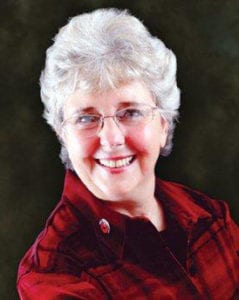 From Coconino to Cochise counties, seven Flinn-Brown Fellows are working through Arizona’s community colleges—three as elected district governing-board members and four through their professional careers—to ensure quality education options and services for Arizonans. The Fellows’ roles and expertise in post-secondary education are critical to their aims for state-level service.
From Coconino to Cochise counties, seven Flinn-Brown Fellows are working through Arizona’s community colleges—three as elected district governing-board members and four through their professional careers—to ensure quality education options and services for Arizonans. The Fellows’ roles and expertise in post-secondary education are critical to their aims for state-level service.
The state’s 19 public community colleges and three tribal colleges serve hundreds of thousands of Arizonans, from Kingman to Thatcher, offering degree and certificate programs, workforce training, and special-interest classes. AZTransfer, a partnership between the community colleges and state universities, ensures that students move readily from institution to institution.
Recent state-level discussion of educational attainment goals have coalesced around a target of 60 percent of Arizonans achieving some type of postsecondary degree or high-quality certificate by 2030—a goal that would be impossible to consider without the work of the community colleges.
This article, the first of two on Flinn-Brown Fellows in community-college roles, profiles the three Fellows serving as elected district governing-board members in the counties of Cochise, Coconino, and Pima.
Demion Clinco, Marie Peoples, and Jane Strain are three Flinn-Brown Fellows serving on community-college governing boards in Arizona. They represent rural areas that extend to the state’s northern and southern border, as well as Arizona’s second largest city. The three Fellows were all initially appointed to fill vacancies, and later were elected in nonpartisan races to serve unpaid, six-year terms.
Clinco, Peoples, and Strain each participated in different cohorts of the Flinn-Brown Civic Leadership Academy, but are all currently active in the 260-member Flinn-Brown Network, a community that leverages connections among Flinn-Brown Fellows to help individual Fellows accelerate their pursuit of state-level civic leadership.
When Strain, who lives in Sierra Vista, learned that a Flinn-Brown Fellow was running for a community-college governing-board seat in Coconino County, she called Peoples in Flagstaff and asked if she could make a donation or could provide any other campaign assistance.
At the time, the two had never met.
“That shows the power of the Flinn-Brown Network,” Peoples says. “She contacted me out of the blue, and I hope I can pay that forward.”
Clinco, likewise, says Flinn-Brown Fellows have been very supportive of him during his campaigns for office, including for a seat in the Arizona Legislature.
“This network of people to support you once you go through Flinn-Brown really exists,” Clinco says. “This is a network of people who are enthusiastic, go door-to-door, campaign, and collect signatures for you. That’s incredible.”
 Demion Clinco
Demion Clinco
Clinco first became involved in Tucson policy and politics after he was appointed a decade ago to the Tucson-Pima County Historic Commission, which led to his role as president of the Tucson Historic Preservation Foundation, where he continues to work as the organization’s CEO with leaders at the local, state, and national level.
Early in 2014, shortly after completing the Flinn-Brown Civic Leadership Academy seminar series, the Tucson native was appointed to fill a vacated seat in the Arizona House of Representatives—where he served for about a year, losing his re-election bid. Clinco says he would not have sought the appointment had he not gone through the Flinn-Brown program.
“It really added a tremendous value to me personally understanding the state of Arizona and the full spectrum of major policy issues facing the state,” Clinco says.
In December 2015, Clinco was appointed to fill a vacancy on the Pima Community College governing board. He was elected to a full six-year term in November 2016.
Clinco says his past political experience, as well as being involved with a family business, uniquely positioned him to help the Pima board navigate its recent accreditation issues, personnel changes for the board and executive leadership, and systemic and transformative reorganization.
Clinco says that leaders of community colleges interact with state policy leaders and the legislature consistently, whether working on the colleges’ budget or other issues.
“Really, the role of board members is not just to serve in policy leadership for the college but also advocate for resources statewide,” he says.
Clinco’s family owns a health-care company that employs certified nursing assistants and professionals who have graduated from Pima Community College, which he says provides him a day-to-day understanding of how important a high-functioning community college is for both workers and employers.
Pima Community College has six locations throughout the greater Tucson area, plus learning and education centers.
 Marie Peoples
Marie Peoples
Peoples started her full-time position as Coconino County’s chief health officer in 2013 in Flagstaff after holding a similar position for the Missouri Department of Health. She was attracted to the racial and cultural diversity of the county—which is also the second largest in geographical size in the United States. In Missouri, Peoples had leadership roles including being elected to her local K-12 school board, and she wanted to do the same in Arizona.
When a vacancy occurred on the Coconino County Community College governing board in 2014, Peoples was appointed to fill the position. A year later she was competitively selected as a Flinn-Brown Fellow.
Peoples says that she is passionate about policy and expects to become more involved in state-level civic leadership.
“For me being a newbie in the state, Flinn-Brown provided a great history about Arizona, and I really liked how it showed things from all perspectives,” Peoples says. “I liked the high-level thinking and conversations, and you learn what’s important for Arizona and what the challenges and resources are.”
In November 2016, Peoples ran unopposed for a full six-year term on the Coconino County Community College governing board.
As a governing-board member, Peoples has helped recruit a new president after the previous president moved to a larger college. Now she and her colleagues are grappling with financial issues after voters failed to approve recent overrides. That outcome has led her to a deeper understanding of the county’s voters.
“As a community-college board, we need to meet people where they are at. These are our customers and we want people to choose us,” Peoples says. “I also think community relationships become more important in a rural area. It’s important to know your neighbors, and you do not have as many business-partnership opportunities [as in a city], so you really have to nurture those.”
Coconino Community College has two Flagstaff campuses and instructional sites in Fredonia, Grand Canyon, Page, Tuba City and Williams, with online classes as well.
 Jane Strain
Jane Strain
Strain first joined the Cochise College governing board in 1996 when she was appointed to take over the term of an ill friend. She finished that term and has run every six years since, most recently in 2012. Her position is her first and only public office.
Strain served in the U.S. Army for 21 years, including four years at Fort Huachuca in Sierra Vista, where she lives today. She became involved in Arizona Town Hall and later a supporter of First Things First and Expect More Arizona.
Strain acknowledges that she was hesitant to apply for Flinn-Brown.
“This was truly out of my comfort zone but I loved it once I got there,” Strain says. “I met very amazing people, which is one of the great things about the Flinn-Brown concept. Rural people need to get up to Phoenix, and once you know these people, it all begins to connect.”
Strain says that her work on the Cochise College board isn’t easy, with substantial preparatory work leading into each meeting and each key decision affecting students, faculty and staff, and the broader community. And she believes it’s important to be present in the community and available to constituents.
Last year, Strain was named chair of the Arizona Association of District Governing Boards, a statewide organization representing the 10 community college systems in the state. One member from each board is chosen to meet. Strain hopes to improve the structure and mission of the statewide group.
“Theoretically, this organization has tons of potential, and tons of work can be done once we realize what work we need to do,” Strain says.
Strain previously served as Pacific Region Chair of ADGGB, a national community college board.
Cochise College has campuses in Sierra Vista and Douglas, along with centers in Benson, Nogales, and Willcox, and online classes.